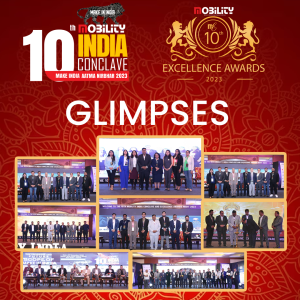As the nation awaits the Interim Budget 2024 on February 1,the nation looks forward to the Union Budget 2024-25 with expectations of strategic measures that drive economic growth, innovation, and resilience. The upcoming budget holds the key to shaping a path toward prosperity and progress for our nation in the fiscal year ahead. Prominent industry leaders voice their expectations for the Union Budget 2024-25.

A low corporate tax rate will incentivize both global and domestic businesses to establish manufacturing facilities in India by reducing the early startup costs and enabling them to maintain price competitiveness. This would further advance the “Made in India” campaign and encourage businesses to introduce cutting-edge and technological know-how to India, improving productivity and quality. Additionally, it is very important to scale the existing PLI scheme for electronics to encourage Indian manufacturers.
Mr. Avneet Singh Marwah, Director and CEO, Super Plastronics Pvt Ltd, a Kodak brand Lincensee

Union Budget 2024 is very crucial to maintain India’s standing as the 3rd largest economy in the world. India contributes $3.7 trillion to the $100 trillion global economy and has the highest young population. To fully realize this potential, the government ought to support consumption. In line with the strong GST trend, we anticipate cutting the GST on LED TVs larger than 32 inches from 28% to 18% in Budget 2024. For the market to flourish, PLI schemes must be expanded to include smart TVs, refrigerators, and washing machines. Income tax slabs might be reevaluated to improve disposable income, which will promote spending and raise consumption in general.
Mr. Akash Sinha, CEO & Co-Founder, Cashfree Payments

In the Union budget 2024-25, the government should further push for initiatives that will focus on boosting adoption of digital payments in tier 2 and beyond regions. Policies should incentivise creation of a fertile environment for fintech startups to innovate and build products and solutions that will be more inclusive, adaptable for both consumers and businesses. I also expect the introduction of regulatory frameworks that will help curb digital fraud and build a safer and more secure digital payment environment, reinforcing the trust of users in digital transactions. There is a call for the implementation of a standardized KYC framework across all financial services, aiming to enhance efficiency and promote financial inclusion, in a secure way. Overall, the budget should also announce some provisions to ease financial burden on fintechs and provide tax saving benefits to startups in the sector.
Mr. Manideep Katepalli, Co-Founder at BikeWo

Despite last year’s commendable 33% surge in EV registrations, our industry encounters persistent challenges. Chief among these hurdles is the imperative need for robust charging infrastructure, pivotal in inspiring confidence among potential buyers and propelling the widespread adoption of electric vehicles (EVs) as a sustainable mode of transportation.
Another barrier remains the relatively higher initial cost of EVs, often deterring consumers. However, the promise of life tax subsidies for electric vehicles and the availability of accessible EV financing options hold immense potential to mitigate this challenge.
The integration of EV infrastructure into Priority Sector Lending (PSL) is poised to bolster credit flow into the sector by mandating financial institutions to provide support, thus promising a significant boon.
A supportive regulatory framework coupled with financial incentives aimed at fostering research and development within the EV sector stands as indispensable pillars. These measures not only drive innovation but also attract investments, creating an environment conducive to widespread EV adoption.
Ultimately, these strategic initiatives play a pivotal role in establishing an enduringly sustainable and eco-friendly transportation ecosystem.
Mr. Hari Kiran, Co-Founder and COO, eBikeGo

As thе 2024 Budgеtapproaches, thеautomotivе industry еagеrly awaits insights into thе GST landscapе, particularly for еntry-lеvеl two-whееlеrs. Anticipation surrounds updatеs on thеpotеntial FAME 3 schеmе, PLI sops, and rеvisions to GST for two-whееlеrs. Wеhopе for a continuation of grееn mobility еmphasis, building on thеgovеrnmеnt’sundеrstanding of thе symbiotic rеlationshipbеtwееnеnvironmеntal sustainability and еconomic growth.
Thеrеduction in customs duty on EV parts in thеpreviousbudgеtspurrеd local manufacturing, and similar amеndmеntsarееxpеctеd in thе 2024 budgеt. Calls for a uniform 5% GST on all EV sparе parts, alignеd with thе 5% GST on vеhiclеs, rеsonatе within thе industry, as we aim for a morееquitablе tax structurе.
Looking bеyond financial allocations, we hope thеbudgеt unveils a comprеhеnsivе policy framеwork for EVs, addrеssinglicеnsing, safеty standards, and insurancе norms tailorеd for еlеctricvеhiclеs. To fostеr cost rеduction, a focus on localizing battеry manufacturing is crucial, with incеntivеs for battеry manufacturing units and a robust supply chain for EV componеnts.
Mr. Shubham Vishvakarma, Co-Founder, Chief of Process Engineering

As we anticipate the 2024 budget announcement, we hope for a forward-looking budget that reflects India’s commitment to sustainability and technology advancement. A large volume of India’s end-of-life Lithium-ion batteries is exported globally for recycling or just processed as an intermediate black mass and then exported. Hence, massive R&D investments are required, particularly to create strong competencies and lab testing facilities for the proper end-of-life Lithium-ion battery recycling. This not only contributes to responsible environmentalism but also nurtures a talented pool of individuals.
Another area, where we are hopeful for is the Production-Linked Incentive (PLI) and it’s extension to battery recycling. This would also be a strategic approach as by expanding the range of the scheme beyond just the Advanced Chemistry Cell manufacturing, we open up the opportunity to capture the entire value chain. This extension will incentivize the setting up of homegrown recycling firms instead of shipping away the dead batteries.
We also recommend that the recycling of Lithium-ion batteries be incorporated into the Carbon Credit Trading Scheme. This inclusion, in particular for negative-value battery chemistries feasibility will provide substantial support to India’s position in the carbon credit markets and also demonstrates our continued dedication to sustainable solutions.
Mr. Chakravarthi C., Managing Director, Quantum Energy

In anticipation of the upcoming budget, the Electric Vehicle (EV) industry in India is fervently advocating for crucial measures to sustain and enhance the sector’s growth. With the imminent expiration of the FAME II subsidy program in March 2024, there is a collective call from stakeholders to extend it, ensuring ongoing efforts to enhance the affordability and accessibility of electric vehicles for consumers. Extending the program would not only solidify support for the EV industry but also align with the government’s ambitious target of achieving 30% electric vehicles on Indian roads by 2030. Complementing this extension, the industry is hopeful for a significant reduction in the GST on lithium-ion battery packs and cells from 18% to 5%. Such a revision would substantially alleviate manufacturing costs, enabling manufacturers to offer EVs at more competitive prices, further encouraging consumer adoption. Additionally, stakeholders are seeking a standardized policy for the battery-swapping market. The current fragmentation and varied battery types across different players have led to compatibility challenges and safety concerns, including incidents of fires at swapping stations due to inferior batteries. A standardized policy specifying the type of battery pack, cell, dimensions, and connectors is expected to enhance safety and streamline charging infrastructure, fostering a more reliable and secure environment for EV users.
Mr. Raman Bhatia, Founder & Managing Director, Servotech Power Systems Ltd.

For EV Industry
The announcement of Budget 2024 is coming closer and various industries have their own set of expectations from the upcoming budget including the EV industry. The EV Industry holds a strong potential to revolutionize India’s transportation sector and for the EV industry to flourish there should be a strong push for upskilling and reskilling through centrally sponsored schemes to build a skilled workforce in the evolving EV industry. Sustainable growth in the EV sector is contingent upon technological innovation aimed at reducing costs, extending range, and revolutionizing charging infrastructure. This evolution pivots on developing Battery Management Systems (BMS) and nurturing domestic capabilities for battery manufacturing. Significant government funding, directed specifically at charging infrastructure in Tier II and Tier III cities, emphasizes open data standards and APIs, fostering interoperability and a resilient software ecosystem. Proposals to reduce GST on lithium batteries from 18% to 5% represent a game-changer, significantly cutting down EV acquisition costs and enhancing overall attractiveness.
Strategic promotion of ICE+EV hybrid vehicles, especially in the smaller segment, is considered vital for achieving economies of scale. State policies, supported by the Central Government, are anticipated to incentivize this through investment policies and centrally sponsored schemes. The targeted implementation of Production-Linked Incentive (PLI) schemes for EV charging companies remains a key focus. Ongoing support, including tax deductions for EV purchasers and extension of FAME-II subsidies or the potential introduction of FAME-III, underscores the unwavering commitment to a green transition.
The automotive industry anxiously awaits insights into the GST landscape, particularly for entry-level two-wheelers. Expectations center around potential FAME 3 schemes and a revision of GST rates for electric two-wheelers. Calls for a uniform 5% GST on all EV spare parts, aligning with the 5% GST on vehicles, echo the industry’s aspiration for a more equitable tax structure. Advocacy for innovation-centric initiatives, coupled with capacity-building incentives, is paramount for widespread EV adoption. The recommendation to lower the GST rate on batteries from 18% to 5% aligns battery swapping and subscription services with EVs, representing a crucial step forward.
For Solar Industry
The upcoming Union Budget 2024-25 holds paramount importance for India’s green energy sector. Addressing concerns about solar panel imports, the budget should prioritize measures for indigenous development, technology transfer, and incentives for local manufacturing to curb foreign exchange outflow. The PLI scheme for renewable manufacturing and viability gap funding for battery storage is crucial for advancing India’s energy goals. A revision of GST rates for the renewable energy sector and increased budgetary allocation for batteries under PLI are pressing needs. Focusing on workforce development through AI-driven technology, bulk procurement, and energy storage solutions is essential for sector efficiency. Infrastructure strengthening, public-private partnerships, and streamlined regulations will pave the way for a sustainable energy future. Collaborations to include solar panels in new houses and green FDI initiatives are anticipated. Recommendations for reduced customs duties on solar imports, enhanced concessional finance availability, and a dedicated nodal agency for sector investments underscore the call for a conducive environment. Addressing state restrictions on installed transformer capacity, advocating for unrestricted net metering, and extending the ISTS waiver are critical steps. Reduction in customs duty on solar cells, an extension of ALMM, and shortening project implementation time are needed to support indigenous solar manufacturing, shaping the nation’s energy landscape and influence its global standing in sustainable practices.
Mr. Amit Khatri, Co-Founder, Noise

“India’s resilient economy, fueled by entrepreneurship and proactive governance, is set to reach $5 trillion by 2024. With a projected annual growth rate of 6.3%, India’s ascent to become the third-largest global economy by 2027 is on the horizon.
As we anticipate the upcoming Union budget, a robust regulatory framework fortifying the startup ecosystem, and streamlined funds allocation, alongside strategic efforts in technological advancements, are crucial. A dedicated push to boost R&D and technological opportunities within the country will be pivotal in shaping India’s economic landscape and enhancing global investment.
Initiatives like the PLI scheme have been instrumental in boosting ‘Make in India’ efforts, and we believe the upcoming budget holds the utmost importance in further shaping India’s electronic manufacturing space. We hope for continued support from the government with the push for localizing components as well, fostering an environment that encourages homegrown brands to lead India on the global stage, further accelerating growth and enhancing international prominence.”
Mr. Yogesh Mudras, Managing Director, Informa Markets India

The Budget 2024-25 becomes pivotal in steering the nation towards a greener future. With a commitment to boost green energy to 500 GW by 2030, we anticipate sustained attention on the increased allocations for bio-energy, solar, and wind, alongside higher capital expenditure in green hydrogen and battery storage infrastructure.
Recognizing the critical role of energy storage for grid stability, we applaud the proposed policy incentives for Battery Energy Storage Systems (BESS). The recent approval of a scheme targeting 4,000 MWh of BESS projects by 2030-31, with financial support of up to 40% (Rs. 3,760 crore), marks a significant stride toward a resilient energy landscape.
As India targets 170 GW Renewable Energy capacity by March 2025, the Budget is anticipated to extend existing schemes, including the Production Linked Incentive and viability gap funding. Advocating for policies that stimulate green hydrogen demand, reduce GST on crucial components, and increase funding for R&D to create a stable environment for sustainable development. Informa Markets by organizing The Battery Show and REI Expo, continues to provide a crucial platform for industry leaders to collaborate and contribute to the nation’s sustainable energy journey.
Mr. Ravi Kunwar, Vice President – India & APAC, HMD Global (The Home of Nokia Phones)

As we anticipate the Interim Union Budget 2024, HMD Global holds optimistic expectations for the Indian smartphone market. Foreseeing an extension or enhancement to the Production Linked Incentive (PLI) policy, we aim to fortify local production and encourage an indigenous components supply chain. The budget’s positive impact on operations, particularly in local manufacturing, is anticipated, though precise planning hinges on final announcements. Our wish-list emphasizes more incentives for local production, encouragement for components manufacturing within India, and support for exports. In the face of potential changes, we stand ready to make necessary adjustments, anticipating a budget that builds upon existing policies for stability and growth. HMD Global remains committed to contributing to India’s self-reliance and the global success of its smartphone industry.
Mr. Nemin Vora, CEO, Odysse Electric Vehicles

As we anticipate the union budget for the fiscal year 2024, Odysse, as an electric vehicle (EV) manufacturer, looks forward to a comprehensive and forward-thinking fiscal policy. The electric mobility sector stands at the forefront of transformative change, and we anticipate economic support that reflects the government’s commitment to accelerating this transition. Our expectations include continuation of FAME incentives, robust infrastructure investments, reduced interest rates for EV customers, Dedicated percentage of reserved fund by banks for EV financing and a continued focus on research and development to further propel the growth of the EV industry. A visionary budget can not only drive economic revitalization but also play a pivotal role in creating a sustainable and eco-friendly future.
Mr. Anurag Garg, MD & Country Head, Vitesco Technologies

I am optimistic about the potential growth of the electric vehicle (EV) market in India, despite the current economic slowdown. The government’s commitment to promoting electric mobility is evident through initiatives like the FAME scheme, which plays a pivotal role in fostering sustainable growth by providing subsidies for EV purchases. As we eagerly await the budget 2024, we propose an extension of the FAME II scheme for the coming years. This strategic decision would further incentivize the adoption of electric vehicles and contribute significantly to the nation’s environmental goals. We encourage the government to focus on formulating policies that not only support existing players but also foster an environment conducive to new entrants. I believe that the upcoming budget presents a unique opportunity to propel the electric vehicle sector forward. By extending and enhancing policies that support the industry, the government can accelerate the adoption of electric vehicles, stimulate economic growth, and establish India as a leading player in the global electric mobility landscape.
Dr. Darshan Rana, Chairman and Managing Director, Erisha E Mobility Private Limited

Contributing significantly to the economy, the Electric Vehicle industry has demonstrated a sizeable potential to strengthen the economic growth and progress of the country. As we look towards the upcoming Interim Budget 2024, we expect the honourable Finance Minister Nirmala Sitharaman will revisit GST rates on the vital spare parts of the EVs besides extending the Faster Adoption and Manufacturing of Electric Vehicles (FAME) subsidy scheme for widespread adoption of EVs which offer environmentally friendly and sustainable transportation solutions.

The online skill gaming has been on an explosive trajectory these last few years. With the right regulatory support, this sector has the potential to not only create a thriving ecosystem for gamers and game developers but also to showcase the prowess of Made in India games on the global stage.
The industry eagerly anticipates long-term clarity and a progressive taxation regime from the upcoming financial budget. This clarity is crucial for driving the next phase of growth, as it will not only provide a conducive environment for businesses but also revive investor confidence in the sector. A progressive taxation regime will further incentivize investment, leading to the creation of more job opportunities for our talented youth.
Additionally, we are hopeful that the budget will pave the way for the establishment of dedicated courses in gaming. These courses will play a pivotal role in nurturing the next generation of game developers and professionals, ensuring a steady supply of skilled talent to fuel the industry’s growth.
I look forward to the upcoming financial budget with optimism, as we believe that the right policies and support from the government will propel the online skill gaming industry to greater heights, benefiting the economy in our march towards making India a $5 trillion economy.
Mr. Pradeep Bakshi, MD & CEO, Voltas Limited

With the El Nino effect of 2023 being a thing of the past, the demand for consumer durables is bound to pick up in 2024 and we expect this trend to start peaking with the advent of summers. We firmly believe that the government’s proactive initiatives related to Digitalization and Make in India initiatives will provide the much needed impetus in the right direction for boosting employment and creating global competitiveness for Indian players. We have seen that consumers are increasingly inclined towards products manufactured locally and brands are going all out to fulfill their demands. All these factors coupled with higher disposable incomes will lead to a promising growth impetus. We look forward to a budget that will create a stable and growth oriented tax environment, which will help in ease of doing business and will lead to increased economic activity and demand generation.
Covered By: Mobility India / Budget
If you have an interesting Article / Report/case study to share, please get in touch with us at editors@roymediative.com roy@roymediative.com, 9811346846/9625243429.





